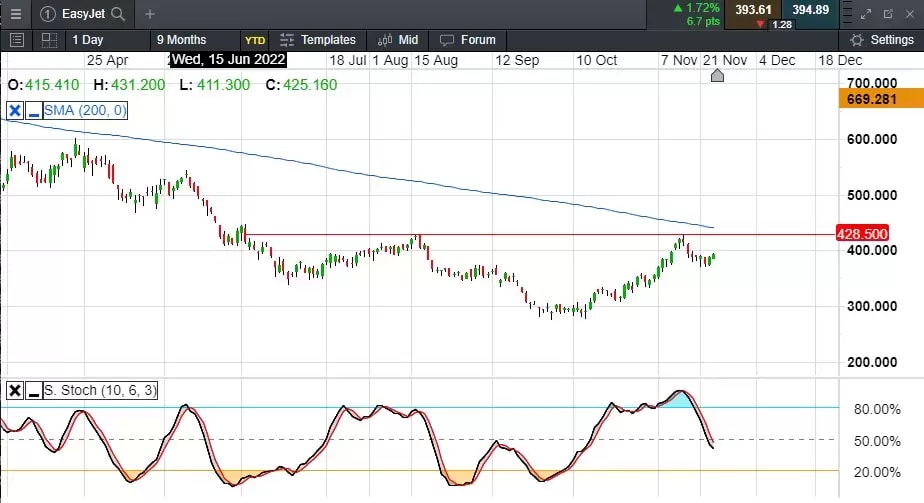
After a difficult few months, budget airline easyJet [EZJ] will announce its full-year 2022 results on 29 November.
In its mid-October trading update, easyJet reported “resilient full year performance despite external headwinds”. The company said it expects to post a pre-tax loss of £170m to £190m, but EBIT could break even.
Headwinds have included inflation, which led many consumers to cut back on leisure travel, and staffing problems, which disrupted thousands of summer flights.
Although shares in easyJet – Europe’s second-biggest low-cost carrier after Ryanair [RYA] – have risen 22% in the last month, they remain down by around a third for the year. The potential for an extended rebound appears limited, according to our chief market analyst, Michael Hewson.
Referring to the chart below, Hewson commented: “Having hit a 10-year low back in October, the easyJet share price has seen a modest rebound, but hasn't been able to take out the August high of 428.5p. Behind that, we have the 200-day simple moving average (SMA), which should also act as resistance. This makes the bar for further gains in the short term quite high”.
easyJet share price, March 2022 - present

Source: CMC Markets
Rising demand for flights
Despite the share price tumble, there are signs that things could be looking up for easyJet. The October trading update highlighted a surge in demand for seats, with the airline projecting that in the first quarter of its 2023 fiscal year flight capacity will increase 30% year-on-year to around 20 million seats. This is the equivalent of approximately 83% of capacity in 2019, the last pre-pandemic year. The company also said it had booked load factors ahead of the same point in 2019.
Johan Lundgren, CEO of easyJet, said that when the summer 2023 season went on sale in October, “we were filling the equivalent of more than four A320 aircraft a minute in the opening hours, demonstrating the continued demand”.
Lundgren added that customers continued to prioritise holidays, despite inflationary pressures and recession risk. “We continue to see robust customer demand. Clearly there is uncertainty out there, but…as we speak now, we have good booking momentum,” he said.
Analysts down on airlines
A McKinsey report published in March gave a pessimistic view on airlines, calling them “the biggest destroyer of value among all aviation subsectors”. The analysts proposed that the market for airlines could shrink post-pandemic, amid rising fuel prices and concerns around climate change.
According to the Financial Times, among 15 analysts offering a 12-month price target for easyJet, the median forecast was 472p. This represents a 16.6% increase on the 25 November closing price of 404.9p. The low estimate of 260p would see the stock losing 35.8% of its value in the next year, while the high estimate of 750p would mean gains of 85.2%.
At the end of October, it was reported that International Consolidated Airlines Group [IAG], which owns British Airways and Aer Lingus, might take over easyJet. The easyJet share price jumped 6% on 31 October in response to the news.
AJ Bell investment director Russ Mould said reports of the deal made “perfect sense”, as business travel continues to shrink. Moreover, owning easyJet would boost IAG’s position in the leisure market and “give it access to many prized airport landing slots”.
The International Air Transport Association (IATA) has said it expects overall traveller numbers to hit 4 billion in 2024, which would be above 2019 levels. In October, IAG said in its trading update “there was no indication of weakness” in its bookings.
Disclaimer: CMC Markets is an execution-only service provider. The material (whether or not it states any opinions) is for general information purposes only, and does not take into account your personal circumstances or objectives. Nothing in this material is (or should be considered to be) financial, investment or other advice on which reliance should be placed. No opinion given in the material constitutes a recommendation by CMC Markets or the author that any particular investment, security, transaction or investment strategy is suitable for any specific person. The material has not been prepared in accordance with legal requirements designed to promote the independence of investment research. Although we are not specifically prevented from dealing before providing this material, we do not seek to take advantage of the material prior to its dissemination.






















